|
|
|
Sort Order |
|
|
|
Items / Page
|
|
|
|
|
|
|
| Srl | Item |
| 1 |
ID:
157950
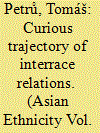

|
|
|
|
|
| Summary/Abstract |
This article aims to examine several interrelated issues pertaining to the historical development of pluralism in areas forming today´s Malaysia. Firstly, it intends to analyze the transformation of the formerly cosmopolitan populations of Malay port polities into the highly ‘racialized’ society of modern Malaysia. It also seeks to clarify the roots of ethnicity-based issues and relations in the country. Lastly, it attempts to challenge the very concept of Malaysia as a society primarily consisting of three ethnic pillars, dominated by the Malays, and ‘complemented’ by the Chinese and the Indians. I argue that the main driving force behind these tensions is the segregational colonial policies and the postcolonial arrangements of the Malay ethnocentrist governments, rather than ethnic and cultural factors as the ruling politicians tend to stress. I also contend that religious issues, especially those stemming from the dakwah movement, are gradually becoming an increasingly important factor in interrace strife.
|
|
|
|
|
|
|
|
|
|
|
|
|
|
|
|
| 2 |
ID:
189023
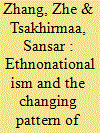

|
|
|
|
|
| Summary/Abstract |
Amid the post-Cold War global revival of ethnonationalism, Kazakhstan – a newly independent state born out of the collapse of the Soviet Union – launched its ‘ethnic repatriation programme’, encouraging ethnic Kazakhs from outside Kazakhstan to ‘return home’. China has a large ethnic Kazakh population and shares a border of more than 1500 km with Kazakhstan in Xinjiang. Since the 1990s, over 150,000 ethnic Kazakhs originally from China have chosen to emigrate to Kazakhstan. Sketching China’s and Kazakhstan’s state policies toward ethnic Kazakh migration since the 1990s, this article addresses how different factors and rationales have shaped individuals’ decisions to emigrate to Kazakhstan or to stay in China. The article relies upon available, multilingual data and over 30 in-depth interviews with respondents in both Kazakhstan and China. We argue that, for ethnic Kazakhs emigrating from China to Kazakhstan, socio-economically and environmentally based rationales, including perceptions of developmental prospects, social welfare benefits and social ties were most salient during the 2000s. However, since the late 2000s, politico-culturally based rationales, such as ethno-nationalism, Kazakh linguistic and cultural concerns, educational opportunities, and other factors have become increasingly salient especially during the 2010s.
|
|
|
|
|
|
|
|
|
|
|
|
|
|
|
|
| 3 |
ID:
148782
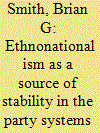

|
|
|
|
|
| Summary/Abstract |
Democratization, economic transformation, and EU accession have shaped the Bulgarian and Romanian party systems in ways similar to that seen across the rest of eastern Europe. A quarter century after democratization, the party systems remain unstable. The article demonstrates that nationalism and ethnic identity provide stable voter salience in party systems that remain dominated by fragmentation, personalistic political parties, and a lack of issue differentiation. An analysis of the use of ethnonationalism by political elites in Bulgaria is contrasted with a briefer analysis of Romania.
|
|
|
|
|
|
|
|
|
|
|
|
|
|
|
|
| 4 |
ID:
143216
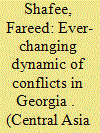

|
|
|
|
|
| Summary/Abstract |
In this article, I will trace the dynamics and changes in internal conflicts in Georgia (Georgian-Ossetian and Georgian-Abkhazian conflicts), and investigate the role of external factors and their interplay with internal factors affecting the dynamic of the conflicts. Mainstream academic literature views the two conflicts as internal. However, after the war in August 2008 that saw visible intervention from Russia, the conflicts, I argue, have turned into intra-state conflict between Georgia and Russia. My further argument is about the decisive role of external factors in the conflicts. The Western and Georgian media tend to emphasize the role of Russia in the conflicts; academic literature is divided over the issue of the influence of external factors. I acknowledge that sometimes Russia’s role is exaggerated and that less attention is paid, particularly in Georgia, to Tbilisi’s wrongdoings. However, overall, the presence and influence of external factors, on at least two occasions, modified the dynamic of the conflicts. Here, along with Russia, other outside players, such as the United States, contributed to the conflicts.
|
|
|
|
|
|
|
|
|
|
|
|
|
|
|
|
| 5 |
ID:
189714
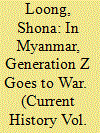

|
|
|
|
|
| Summary/Abstract |
Days after Myanmar’s February 2021 coup, young people took to the streets. The protests were tongue-in-cheek at first, but soon gave way to a grave civil war. Understanding this shift from nonviolent protests to armed resistance requires shedding two frames that have been applied to Myanmar in the past: those of liberal democracy and state failure. Doing so brings into focus how, to an extent unprecedented in Myanmar, the anti-coup movement is challenging entrenched divides between “democracy” and “ethnonationalism,” and between “conflict” and “politics.”
|
|
|
|
|
|
|
|
|
|
|
|
|
|
|
|
| 6 |
ID:
148780


|
|
|
|
|
| Summary/Abstract |
The granting of amnesties has now become a cornerstone of peacebuilding efforts in societies emerging from conflict. Yet, the impact of the role of religion and ethnicity in determining attitudes towards such arrangements has not been empirically assessed. Mindful of this omission, this article investigates the relationship between a range of religious measures — religious practices and beliefs in and about God — and ethnonationalist identity on public attitudes toward amnesty in Northern Ireland. Based on nationally representative survey data, the results suggest that, although Protestants are significantly more opposed to such an initiative than Catholics, both religious beliefs and ethnonational identity are significant, albeit divergent, net predictors with respect to their differing views.
|
|
|
|
|
|
|
|
|
|
|
|
|
|
|
|
| 7 |
ID:
180215
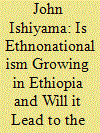

|
|
|
|
|
| Summary/Abstract |
In this paper, I examine whether ethnopolitical identities have grown in Ethiopia since the introduction of Prime Minister Abiy Ahmed’s reforms in 2018, using the most recent Ethiopian survey data from the World Values Survey (wave 5, from 2007 and wave 7, from 2020). I find that although there remains a general popular commitment to a national (Ethiopian) identity, among younger people (especially males) there is a growing sense of an “ethnic” identity and a growing intolerance of other ethnic groups. Further, I find that those who express ethnonational identities are significantly more likely to engage in protest and demonstrations. In conclusion, I suggest that this may not portend well for the future of Ethiopian unity. I also suggest that whether this happens also depends on the institutional transformation of the Prosperity Party (the successor the Ethiopian People’s Revolutionary Democratic Front (EPRDF)) and the level of external support the regime receives from its foreign benefactors.
|
|
|
|
|
|
|
|
|
|
|
|
|
|
|
|
| 8 |
ID:
096286
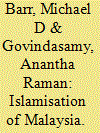

|
|
|
|
|
| Publication |
2010.
|
| Summary/Abstract |
The relationship between religious, ethnic and national identities in Malaysia has long been fraught with uncomfortable tensions-especially for the 50 percent of Malaysians who are outside the dominant Malay-Muslim communal grouping. Until the accession of Dr Mahathir to the prime ministership at the beginning of the 1980s, it was clear that ethnic identity trumped religious identity, even though being Muslim was already intrinsic to being accepted as Malay. Being a non-Malay Malaysian was to accept a subordinate, but not a drastically uncomfortable role in the nation. Since the 1980s, however, religious identity appears to have replaced ethnicity as the central element of nation identity as the society has been systematically-even aggressively-Islamised. Yet appearances can be deceiving, and there is a strong case to be made that Islamisation in Malaysia is basically a variation of the original Malay ethnonationalism, using the nearly complete symbiosis between Malay and Muslim identity as the point of articulation that allows religious nationalism to serve as a cipher for ethnonationalism-but a version of ethnonationalism that is much less accommodating of minorities than was traditional Malay nationalism. This article places contemporary events in a historical context and then focuses on just one aspect of Malaysia's program of Islamisation that is both contemporary and central to national identity-developments in the education system, and particularly within the secondary school history curriculum-to demonstrate that in this instance at least, religious nationalism is operating as a surrogate for ethnic nationalism and has, in fact, intensified ethnic nationalism by raising the stakes for the communities that are outside the core national group.
|
|
|
|
|
|
|
|
|
|
|
|
|
|
|
|
| 9 |
ID:
058939
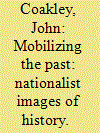

|
|
|
| 10 |
ID:
090394
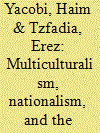

|
|
|
|
|
| Publication |
2009.
|
| Summary/Abstract |
One of the central issues in the study of urban politics today is the fact that many cities have become multicultural arenas. The liberal viewpoint stresses the potential of the city-unlike other spaces-to offer many and equal opportunities for all residents regardless of religion, gender, or ethnic affiliation, but the critical body of knowledge highlights the ways in which the city, although apparently released from the shackles of nation- and state-building projects, continues to reproduce existing power structures and is a stratifying place, maintaining patterns of discrimination, exclusion, and segregation. This tension between the city as an enabling space versus the city as a reinforcer of socionational stratification is at the center of this article.
|
|
|
|
|
|
|
|
|
|
|
|
|
|
|
|
| 11 |
ID:
094437
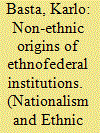

|
|
|
|
|
| Publication |
2010.
|
| Summary/Abstract |
Many scholars argue that the territorial accommodation of nationalist demands usually results from "ethnic" factors, such as the threat of ethnonationalism to the integrity of the state. Using the case of the former Yugoslavia, this article shows that explanations of ethnofederal outcomes must also consider non-ethnic political factors. In the Yugoslav case, the anti-statist ideology of the central leadership provided the autonomy-seeking actors with the discursive means to neutralize their centralist opponents and, in the process, to turn the state into a confederation.
|
|
|
|
|
|
|
|
|
|
|
|
|
|
|
|
| 12 |
ID:
084255
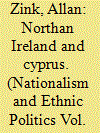

|
|
|
| 13 |
ID:
190309
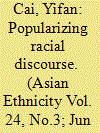

|
|
|
|
|
| Summary/Abstract |
The rise of social media has enabled Chinese migrants in the global south to participate in the production of racial knowledge from grassroots perspectives, adding complexity and dynamism to the racial discourse that was dominated by political and intellectual elites historically. This study investigates anti-black racial discourse on the popular short-video and live-streaming app in China, Kuaishou, where many Africa-based vloggers share their daily life experiences. This study examines the visual and verbal representation of Africans, focusing on 50 short videos posted by Africa-based Chinese and the comments made on them. The analysis shows that the racialization of Africans on Kuaishou is a multilayered process shaped by the intersection of race with other dimensions of identity, including class, gender, and nationality. This paper further illuminates the cultural embeddedness of these thoughts in a South-South setting, and discusses the impacts of different historical-ideological resources on racial thinking in the Chinese context.
|
|
|
|
|
|
|
|
|
|
|
|
|
|
|
|
| 14 |
ID:
093191
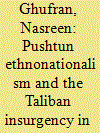

|
|
|
| 15 |
ID:
141272
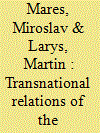

|
|
|
|
|
| Summary/Abstract |
This article describes and analyses the transnational relations of Russian extreme right entities. It classifies the Russian extreme right into categories according to their ideological orientation (ethnonationalism and civilisational nationalism) and forms of activity (political parties and interest groups, intellectuals, the autonomous neo-Nazi scene, and paramilitary formations). For each category important contacts are described in terms of the travels abroad of Russian extreme right activists, visits by foreign extremists to Russia, and the establishment of transnational organisation branches in Russia. The article concludes that although so far the Russian extreme right has mostly had ad hoc contacts abroad, it has been involved in the gradual building of stable networks.
|
|
|
|
|
|
|
|
|
|
|
|
|
|
|
|
| 16 |
ID:
052459
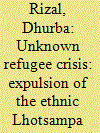

|
|
|
|
|
| Publication |
June 2004.
|
| Summary/Abstract |
Bhutan has been strained by ethnic conflict. The Lhotsampa, one of the three largest ethnic groups, have sought a system of equality under which they would be allocated what they need as an equitable share of Bhutan's polity and economy. The ruling Drukpa elites perceived the Lhotsampa as a threat to their dominance and initiated policies to oppress or force out the Lhotsampa and others through ethnic cleansing. Bhutan's ethnic conflict and the refugee crisis it has produced are the outcome of ethnonationalism clothed in the slogan of 'One Nation, One People', and the contrived mechanisation of the ruling elites. The policies of these elites have effectively disenfranchised people who were born in Bhutan and have lived there for generations as citizens, for no other reason than their ethnicity. This is an issue not just for the Lhotsampa of Bhutan but also for any groups at the receiving end of an ethnically repressive order. The Lhotsampa case illustrates some characteristics of human-rights violations in situations of ethnic strife.
|
|
|
|
|
|
|
|
|
|
|
|
|
|
|
|
|
|
|
|
|